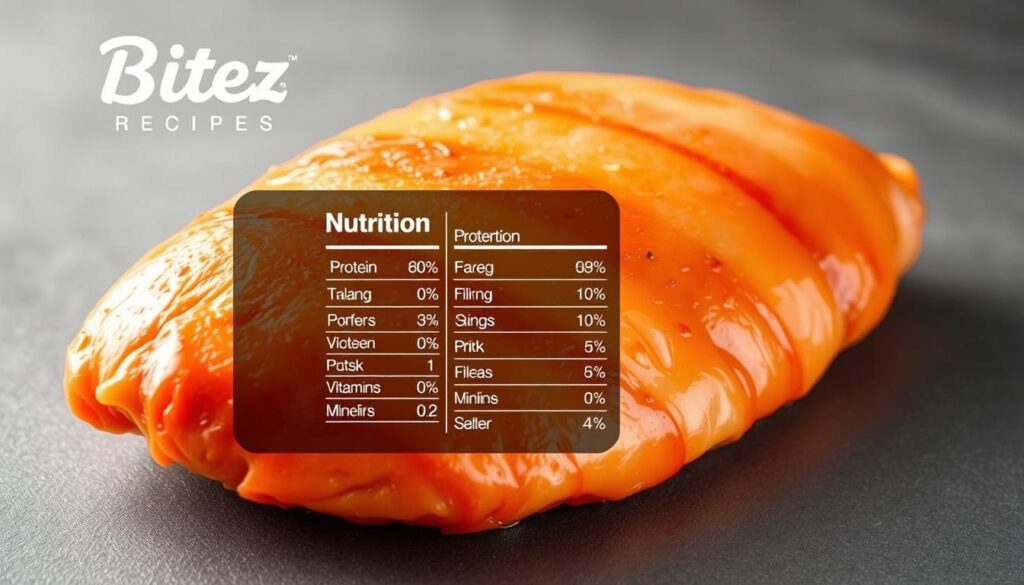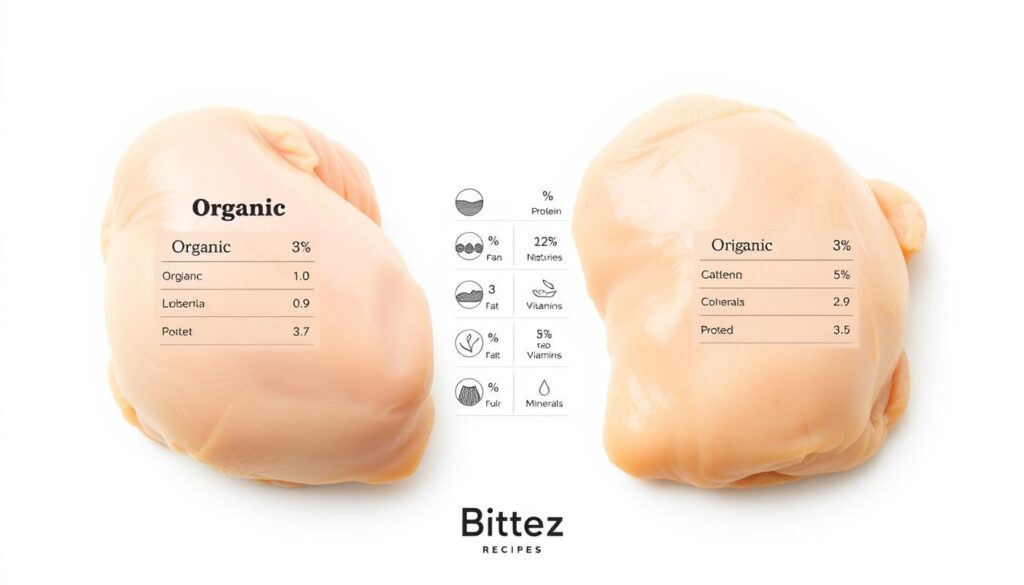Chicken Breast Nutrient is a favorite lean protein, and knowing its nutrient profile is key. It’s packed with nutrients, making it great for a healthy diet. Understanding its benefits can greatly improve your health.

Knowing the nutritional value of chicken breast is crucial. It’s high in protein and low in fat, perfect for a healthy lifestyle. Learning about its nutrients helps you make better diet choices and get the nutrients you need.
Introduction to Chicken Breast Nutrients
In this article, we’ll explore chicken breast nutrients. We’ll look at its nutritional value and health benefits. From its protein to vitamins and minerals, we’ll see how it can boost your diet.
Key Takeaways
- Chicken breast is a lean protein source with high chicken breast nutritional value
- Understanding the chicken breast nutrient profile is essential for making informed dietary decisions
- Chicken breast is rich in protein and low in fat, making it an ideal food for a healthy lifestyle
- The chicken breast nutritional value includes a range of essential vitamins and minerals
- Learning about chicken breast nutrients can help individuals make healthy choices and maintain overall well-being
Understanding the Nutritional Value of Chicken Breast
Chicken breast is a favorite protein source for many. Its high protein and low fat make it great for health lovers. A single serving of chicken breast is packed with protein, helping muscles grow and stay strong.
Knowing about chicken breast nutrition is key to enjoying its benefits. A serving size is 3-4 ounces. This size has about 110-120 calories, making it a low-calorie choice.
Macronutrient Breakdown
The macronutrient breakdown of chicken breast is as follows:
- Protein: 26-30 grams per 3-ounce serving
- Fat: 3-4 grams per 3-ounce serving
- Carbohydrates: 0 grams per 3-ounce serving
Understanding chicken breast nutrition helps you make better diet choices. Its high protein and low fat make it perfect for a healthy meal. It’s great for anyone wanting to eat better, whether for fitness or health reasons.
Complete Chicken Breast Nutrient Breakdown
Chicken breast is packed with essential vitamins, minerals, and chicken breast macro nutrients. It’s high in protein, which is great for those wanting to boost their protein intake. Plus, it’s low in fat and calories, appealing to health-conscious folks.
Looking at the nutrients in chicken breast, we see a mix of chicken breast macro nutrients. This includes protein, carbs, and healthy fats. Here’s a detailed look at what’s in a 3-ounce serving:
| Nutrient | Amount per 3-ounce serving |
|---|---|
| Protein | 26-30 grams |
| Carbohydrates | 0-1 gram |
| Fat | 3-4 grams |
| Vitamin B6 | 25-30% of the Daily Value (DV) |
| Niacin | 45-50% of the DV |
The table highlights chicken breast’s role as a top source of chicken breast nutrient benefits. It’s rich in protein, vitamin B6, and niacin. These nutrients are key for good health, making chicken breast a smart choice for a healthy diet.

Protein Content and Amino Acid Profile
Chicken breast is famous for its high chicken breast protein content. It’s perfect for those looking to boost their protein intake. A 3-ounce serving has about 26 grams of protein, which is half of what we need daily.
The amino acids in chicken breast are also key. They include all nine essential amino acids our bodies can’t make. These amino acids help with muscle growth and repair. The benefits of chicken breast include being a complete protein source, great for health and wellness.

Essential Amino Acids
- Histidine
- Isoleucine
- Leucine
- Lysine
- Methionine
- Phenylalanine
- Threonine
- Tryptophan
- Valine
Chicken breast has all the essential amino acids. This makes it high in protein quality. It’s a top choice for muscle health and overall well-being. Its high chicken breast protein content and amino acids make it a favorite in healthy diets.
Fat Content and Types of Fats
Chicken breast is known for being low in fat, making it a lean protein. It has mostly unsaturated fats, which are good for health. These fats add to the chicken breast nutritional value and its chicken breast health benefits.
Chicken breast contains monounsaturated and polyunsaturated fats. These fats help keep cholesterol levels healthy and lower heart disease risk. It also has a small amount of saturated fats, which are good for health. The mix of fats makes chicken breast nutritious and beneficial for health.

The fats in chicken breast improve heart health, reduce inflammation, and support brain function. They also help absorb vitamins A, D, E, and K, which are good for skin, hair, and eyes. Eating chicken breast can help you get these health benefits.
The fat content is a key part of chicken breast’s nutritional value. It affects the food’s calorie count and nutrient profile. Knowing about the fats in chicken breast helps you make better diet choices and enjoy its health benefits.
Vitamin Profile of Chicken Breast
Chicken breast is packed with essential vitamins, making it great for a healthy diet. It’s full of B-complex vitamins, which help with energy, nerve function, and heart health. Niacin and vitamin B6 in chicken breast are also key for healthy skin, hair, and muscles.
Chicken breast also has fat-soluble vitamins like A, D, E, and K. These vitamins are vital for good vision, immune function, and strong bones. Chicken breast is especially rich in vitamin B6 and niacin.

Key Vitamins in Chicken Breast
- Vitamin B6: essential for brain function and development
- Niacin: crucial for energy production and maintaining healthy skin
- Vitamin A: important for healthy vision and immune function
Eating chicken breast can boost your health thanks to its vitamins and nutrients. It’s not only nutritious but also low in calories. This makes chicken breast a top pick for a balanced diet.
Essential Minerals in Chicken Breast
Chicken breast is packed with minerals that are good for your health. It has phosphorus, potassium, and sodium. These minerals help keep your bones strong, blood pressure in check, and fluids balanced. They also help with energy production and boost your immune system.
Chicken breast offers many health benefits, thanks to its mineral content. Phosphorus is key for strong bones and teeth. Potassium helps control blood pressure and supports a healthy heart. The amount of minerals in chicken breast can change based on how it’s cooked and the portion size.
Here’s a look at the minerals in chicken breast:
- Phosphorus: 200-250 mg per 3-ounce serving
- Potassium: 300-350 mg per 3-ounce serving
- Sodium: 200-250 mg per 3-ounce serving

Eating chicken breast can improve your health in many ways. It supports bone health and helps manage blood pressure. With its rich mineral content, chicken breast is a great choice for a healthy diet.
Health Benefits of Chicken Breast Nutrients
Chicken breast is packed with nutrients, making it a great choice for a healthy diet. It’s high in protein, low in fat, and full of vitamins and minerals. Eating chicken breast regularly can boost your overall health, helping your body function better.
Chicken breast offers many benefits, like building muscles and helping with weight control. It also supports your immune system. Here are some key reasons to add chicken breast to your meals:
- High-quality protein for muscle growth and repair
- Low calorie and fat content for weight management
- Rich in vitamins and minerals, such as niacin, vitamin B6, and selenium, which support immune function
These benefits of chicken breast make it a top pick for a healthy diet. It provides essential nutrients and supports your health and wellness. Knowing the nutritional value and health perks of chicken breast helps you make better food choices.

Adding chicken breast to your meals is simple and tasty, with many recipe options. You can grill, bake, or sauté it to fit your taste. Chicken breast is a nutritious and tasty protein choice, perfect for a healthy diet.
Comparing Organic vs. Conventional Chicken Breast Nutrients
Many people wonder about the difference in nutrients between organic and conventional chicken breast. The nutritional value can change based on how the chicken is farmed. Organic chicken is often seen as healthier because it doesn’t have antibiotics, hormones, or pesticides.
Conventional farming can harm the environment, causing pollution in soil and water. Organic farming is better for the planet. The diet and living conditions of the chickens also affect the nutrient content of the chicken breast.

Here are some main differences in nutritional value between organic and conventional chicken breast:
- Organic chicken breast has more omega-3 fatty acids.
- It has less saturated fats than conventional chicken breast.
- Organic chicken breast has more antioxidants.
Choosing between organic and conventional chicken breast depends on what you value most. If you want better nutrients and less environmental harm, go for organic. But if you’re watching your budget, conventional chicken is still a good protein source.
How Cooking Methods Affect Nutrient Content
Choosing the right cooking method for chicken breast is key. It affects how much nutrition you get from it. To keep the nutrients in, pick a method that doesn’t let them slip away.
Grilling or baking are good choices. They cook chicken evenly and keep more nutrients in. But frying can cause a big loss of vitamins like C and B.
Here are some tips to keep chicken breast nutrients intact:
- Choose gentle cooking methods like poaching or steaming
- Avoid overcooking, as this can lead to nutrient loss
- Use minimal amounts of oil when cooking
By following these tips, you can keep more nutrients in your chicken breast. A balanced diet with foods like chicken breast is best for your health.

Best Storage Practices for Maintaining Nutrient Quality
To keep Chicken breast fresh, proper storage is key. If chicken breast is not stored right, it can lose its nutrients. This affects its nutritional value.
Storing chicken breast needs careful attention to prevent nutrient loss. Here are some tips to keep chicken breast nutrients intact:
- Store chicken breast in a sealed container to prevent moisture and other contaminants from affecting its quality.
- Keep chicken breast refrigerated at a temperature of 40°F (4°C) or below to slow down bacterial growth.
- Freeze chicken breast at 0°F (-18°C) or below to preserve its nutrient quality for a longer period.
Signs of nutrient degradation in chicken breast include a slimy texture, an off smell, and discoloration. If you see these signs, it’s best to throw out the chicken breast to avoid foodborne illness.

By following these storage tips, you can keep chicken breast nutrients fresh. Proper storage is vital to preserve the nutritional value of chicken breast. This ensures you get the most out of this nutritious food.
Conclusion: Making the Most of Chicken Breast’s Nutritional Benefits
Chicken breast is packed with nutrients that boost a healthy diet. Knowing its nutrient profile and health benefits helps you choose it wisely for meals.
It’s rich in protein and essential amino acids, plus vitamins and minerals. This makes it great for building muscle, managing weight, and overall health. Proper storage and cooking keep its nutrients intact, so you get the most from it.
Choose organic or conventional chicken breast, but make it a staple in your diet. Doing so supports a healthy lifestyle and unlocks chicken breast’s many benefits.
FAQ
What is the nutrient profile of chicken breast?
Chicken breast is packed with high-quality protein and essential vitamins and minerals. It’s low in fat and calories, making it great for those watching their diet.
How much protein is in chicken breast?
Chicken breast is a top protein source, offering about 31 grams per 4-ounce serving. It has all the amino acids needed for muscle growth and repair.
What are the health benefits of consuming chicken breast?
Chicken breast is a lean protein that helps build and maintain muscle. It also aids in weight management, boosts the immune system, and supports overall health.
How does the nutrient profile of organic chicken breast differ from conventional chicken breast?
Organic chicken breast might have more vitamins and minerals than conventional chicken. This is because organic chicken is raised without synthetic additives. Both types are nutritious, though.
How do different cooking methods affect the nutrient content of chicken breast?
Cooking methods can change chicken breast’s nutrient levels. Grilling, baking, or poaching keeps more nutrients than frying, which can lose some vitamins and minerals.
What are the best storage practices for maintaining the nutrient quality of chicken breast?
To keep chicken breast nutritious, store it right. Refrigerate or freeze it and use it within the recommended time. This helps preserve its nutrients.
What are the essential minerals found in chicken breast?
Chicken breast is rich in minerals like selenium, phosphorus, and niacin. These minerals are vital for many bodily functions.
Does chicken breast contain any anti-inflammatory properties?
Yes, chicken breast has anti-inflammatory properties. Its high protein and nutrients like vitamin B6 and selenium help reduce body inflammation.








